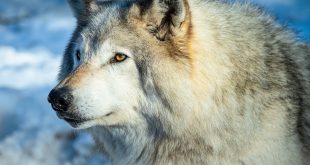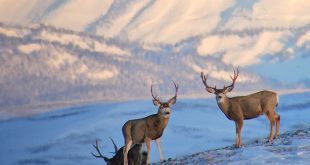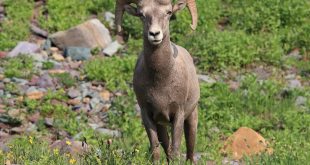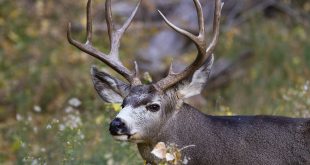Sitting in a deer blind isn’t my thing. I remember as a kid reading hunting articles about hunters in the Midwest who would sit in a ground blind or a tree stand from sunup to sundown and wondering what kind of super humans they must be. The thought of sitting in one place that long makes me squirm, even in simple ponderance.
Growing up, we drove, hiked, glassed, and hiked some more in the familiar pursuit of high-country mule deer. My cotton, blaze orange hoodie dragging on the ground as I tried to keep up with the grown-ups was what dreams were made of. The crisp Fall air and smell of sage bring back great memories of misery and joy that are difficult to articulate, just as seeing a wide muley buck does. Mountain mule deer hunting was and is home. Always moving, always searching, conditions ever changing. Sitting in a blind looking at a soybean field all day wasn’t.
However, a few weeks ago you’d never believe where I was… sitting in a deer blind overlooking a clearing in north Idaho. While it wasn’t a soybean field in Tennessee, I found myself surprised by the joy I had as I waited patiently for a mountain whitetail to make a mistake. Whitetail hunting is a new passion of mine, dating maybe five years back or so. Although I’ve taken a couple good bucks, and I really enjoy it, it will never replace mule deer hunting. This is where I was when I received an email requesting I write an article on a “conservation topic of my choice.”
Not that I’m any good at it, but I enjoy writing. I can write hunting how-to articles at the drop of a hat, and counter many anti-hunting arguments in a succinct, fifteen hundred word slam dunk of a write-up. However, a conservation topic? This will be a first.
I’m often troubled by the conservation discussion. Not because I’m not a conservationist or believe that hunting is not conservation, I subscribe to this concept and am committed to defending it. Hunting is undoubtedly a huge conservation tool. I’m troubled because it’s a term that tends to get over used, or even misused.
We’ve all seen the social media threads the anti-hunters use to try and disarm the hunting community and diminish what hunting has achieved in North America. Then, reading on, we see lame attempts by hunters using this phrase to debate with the anti-hunter without substance or data. Just saying hunting is conservation doesn’t mean hunting IS conservation.
First, what is conservation? I can dazzle you with describing the Latin origin of conservare, or we can just be real with each other. We all understand that to conserve, is to preserve or guard, to keep. During a drought, we conserve water. During a long backcountry hunt, we conserve food. During these painful gas prices, we conserve fuel. It’s that simple.
In the context of hunting, we aim to conserve our wild species and the habitats they call home. As hunters, we’ve done a damn fine job of it in North America. Mostly.
It’s easy to cite the data about dwindling whitetail numbers or nearly extinct turkey populations in the early 1900’s, but what about the bison or the passenger pigeon? It’s important to understand our failures, because conservation is a very holistic endeavor. I bring this up only to highlight the importance of understanding it on a deeper level when it comes to defending our lifestyle against those who seek to destroy it.
Too many hunters look at the revenue from tag purchases as their source to conservation efforts. A few decades ago, this would have been true. However, in the court of public opinion, this contribution won’t hold up against the onslaught of anti-hunting organizations who are well-funded, organized, and hell bent on turning the public against us. They do this through strategically placed ads propagated on the 90% of Americans who don’t hunt.
To compound the issue, we live in a time where people feel this tribal need to attach themselves to a cause. Right or wrong, they need a cause to feel just and righteous in a world where reactionary thumbs up on Twitter fill them with a sense of belonging. And for someone who doesn’t hunt and won’t use lethal means for pest control, latching on to the anti-hunting message is an easy way to satisfy this void. They have found a tribe and will happily join the growing ranks of angry voices desperate to be heard in a very loud world.
This is why simply purchasing a deer tag is no longer enough to call yourself a conservationist.
I’ve said this on my show a million times or more, but hunting is not a hobby. We’re not knitting sweaters in a club, collecting bottle caps in a basement, or dabbling in backwards water skiing in July. Hunting is a lifestyle. Hunting is deeply seeded into the depths of our primal souls and as such, deserves more effort than what we’ve been delivering. We must stand and fight in a united front and defend our title as North America’s greatest conservationists. Those who hate us want the title, and are willing to spend billions to take it from us.
I completely understand those who grumble about such a request or brush the premise off entirely. We don’t want this fight. We want to focus on the next hunt. There is planning, getting the right tags, gear to buy, rifles to zero, bows to tune, and then the flood gates of crunch time opens up when season comes. We want to hunt.
I agree, I just want to hunt. In fact, I live in two seasons; getting ready for season and hunting season. I have little time or money to dedicate outside of it, and conservation isn’t nearly as sexy as my new rifle or spotting scope. Here’s the problem, if I don’t find more time and money I will cease to have hunting seasons to plan for and utilize that new rifle.
I used to think that my conservation efforts were going to ensure that my kids and grandkids have wildlife to hunt, the habitat to hunt in, and the right to do so. I now believe that my efforts will contribute to my own personal ability to do so twenty years from now. In the last decade, I’ve witnessed trapping banned, spring bear hunts canceled, mountain lion hunting outlawed, and an endless flow of anti-hunting legislative moves or lawsuits in pursuit of the end to hunting. This is the age in which we live, and our countermeasures now are critical.
What does conservation have to do with the fight against anti-hunting organizations? Everything. The current data and science favors hunting, despite the phony propaganda they produce on a regular basis. It is true that hunting and hunters contribute the majority of all funding towards conservation efforts. However, the data is easily skewed in favor of the anti-hunter.
It’s much easier to make an emotional plea against hunting than defend against it with boring old facts. This is where conservation comes into play.
When an anti-hunting group takes a case to court, our defense mechanism is the actual science, and funding we provide. That’s easy, and it’s why the anti-hunting movement has failed many times to gain much traction in court. But what about the court of public opinion mentioned above?
This is where traction is gained. The anti-hunting movement has shifted gears into making their claims for change to legislatures. We all know the outcome, legislation is introduced by people who know nothing about wildlife management or the decades of success via the North American Model of Wildlife Conservation, and boom. Another hunt is banned. This is extremely difficult to combat.
By being stronger conservationists than our counterparts, it would be difficult for even greasy politicians to be persuaded in the wrong direction. This isn’t that difficult. Can you cite the amount of money PETA has given to establish mule deer highway crossing corridors to reduce traffic fatalities to migrating deer? Neither can I. But I can find tons of data on how much work the Mule Deer Foundation has put into such efforts.
How about this, how many elk herds have been restored to states without elk due to the money the Humane Society of the United States has contributed to these efforts? Zip. That’s because of pro-hunting groups like the Rocky Mountain Elk Foundation.
In case you’re not smelling what I’m stepping in, these are some of the vehicles we drive funding for to achieve complete dominance in wildlife conservation. If every hunter increased their conservation footprint by a mere 10%, our future wouldn’t look nearly as bleak.
This minor conservation effort can be a combination of small things you can do to make a difference, some don’t cost you a dime. Here is a quick reference list to make it extra easy:
- Renew your memberships to organizations that align with your values; MDF, RMEF, Pheasants Forever, etc…
- Attend banquets or buy $100 worth of online raffle tickets sponsored by these organizations. Instead of a $1,200 spotting scope, by an $1,100 spotting scope and use the extra $100 for fundraising.
- Volunteer one Saturday a year to habitat restoration.
- Buy tags, go hunting. I know, twist your arm.
- Buy hunting gear from companies who support conservation with their revenue dollars. There’s a bunch and Patagonia or The North Face aren’t on the list!
- Shoot one turkey instead of two in areas where populations are struggling. (DM me if you need two, I know where populations are NOT struggling)
- Share a conservation success story on social media for non-hunters to see. (Wildlife crossing corridor pics are great!)
- Buy guns, buy ammo. (Google Pittman Robertson if you don’t know why)
- Learn what conservation is, where money comes from and how it’s allotted, and share this information to family/coworkers/friends who don’t hunt. Take two hours out of your year and research this topic. It may surprise you.
- Share hunting stories that aren’t just about the kill. Detail the work and care you put into your hunts to non-hunters. Try to open minds.
See? This is super easy stuff that actually makes an impact. Every hunter should commit to adding this 10% effort each year. The problem with advocating for conservation efforts is that it sometimes gets overwhelming and complicated. We see it as some huge thing that needs to happen, or a huge amount of money we need to spend. It doesn’t need to be this way. As a collective, we should understand that a little bit from a large quantity of people creates an overwhelming result for our team.
With roughly ten million hunters in America giving roughly $100 a year, one Saturday a year, and sharing a few positive hunting facts with non-hunters, imagine the impact. If you value wildlife and hunting as much as I do, I have a feeling we’re going to save hunting for all of us.
 Eastmans' Official Blog | Mule Deer, Antelope, Elk Hunting and Bowhunting Magazine | Eastmans' Hunting Journals
Eastmans' Official Blog | Mule Deer, Antelope, Elk Hunting and Bowhunting Magazine | Eastmans' Hunting Journals






Superb article!
I might add that every hunter needs to be a member of not only their favorite conservation organization, but also Safari Club International – SCI has the politcal horsepower to affect change in the political arena. Most conservation groups are not able to put money or time into politics because of tax status – SCI can.
Jim,
Awesome job on your first conservation article. Your points and purposes are spot on!! One minor additional opportunity with many benefits is to join a local, hunting positive organization. These include archery clubs, shooting clubs and related groups like the Wake County Wildlife Club here in NC. Keep up the fight! Joe L.
Best article you have written. We need someone like you to start a conservation group. I would donate to it. I have thought for years that you guys would do the job I wanted done for conversation
Awesome!
I am fellow North Idahoan and listen to your podcast but had no idea you could write so well ! 🙂
Thank you for the great ideas on how such simple efforts could help so much.
Another suggestion. Don’t just assume that members of one particular political party are pro-hunting and the other are not. Know what your individual member of your state legislature or Congress actually says, but more importantly does. Case in point. My Congressional Representative is a Republican and she and over 50 of her Republican colleagues have proposed to end funding for the Pittman-Robertson and the Dingell-Johnson Act. Certainly not pro-hunting.
To the hunters that helped a vegetarian deal with an injured Doe.
—
I miss Mama.
When I first moved to Council Bluffs, I saw this seriously injured Mama deer.
If you watch the video carefully, you can see that one of her back hooves was mangled pretty badly.
My neighbors knew exactly who she was, and they told me that the injury had happened years ago. She was hit by a car and left to fend for herself and her broken hoof. They told me that she “must be over 15 years old by now!” ….
Everyone was concerned but few knew what to do.
So, I went online and did some research about trying to help a doe with a seriously injured hoof.
There wasn’t much out there so I was very frustrated.
Oddly, it was on a site meant for hunters where I got the most help.
A little-known fact, for vegetarians like me – hunters are SERIOUS conservationists. They care deeply about the deer herd and when I posted my concern about this poor doe, I was overwhelmed with replies of concern for this grandma doe.
It was the hunters that told me about the importance of apples in an injured doe. Apples will help with swelling and act, almost like an antibiotic, for deer who are injured.
My poor doe (I gave her the name Mama because she was clearly the matriarch of the herd) had horrible swelling and her limp was horrific.
Every year she gave birth to two fawns.
I really didn’t know how she survived the mating process, much less the birthing process BUT she did!
The hunters gave me lots of advice on how to help her and her young.
Over time, their suggesting paid off.
Slowly but surely, the swelling went down.
Her hoof would never be normal, but she was walking ten times better than before.
As suggested, I made sure she had fresh water every day and lots of good deer food that I bought Bomgaars and Trailer Supply, along with apples and other fruits and veggies (as prescribed the hunter people).
I stayed the course and, she came daily for her food and her support.
In truth? We became buddies. When she came into the yard, my eyes lit up and SO DID HERS.
We knew each other and THAT meant the world to me.
About 3 or 4 years went by and one day she didn’t show up for her food. Days went by… Then weeks.
She stopped coming to my house. Her fawns did kept coming, as well as her grandkids and great grandkids but …
She simply disappeared.
She would have been over 20 years old by that time.
I’m pretty sure that our Matriarch had come to that time of life where she decided it was time to lay down and let go.
I’ve never forgotten her.
Her progeny still come through my yard and get their daily apples.
—–
I miss Mama.
Thank you to all the hunters and their allies who chipped in with love and concern for this grandma’s doe’s life.
Your concern and care made a real difference in this particular does life.
You also educated me to that importance of hunters in the balance of life.
I know Mama would thank you, if she could.
I thank you, for sure.
You taught me a lot about conservation and why hunting in important in helping the deer herd to remain healthy and resilient.
Thanks again.
Sorry .. Here’s the video of Mama and babies.
https://youtu.be/r3M-CRhFYXo?si=U6VH8hrjZHGggObW